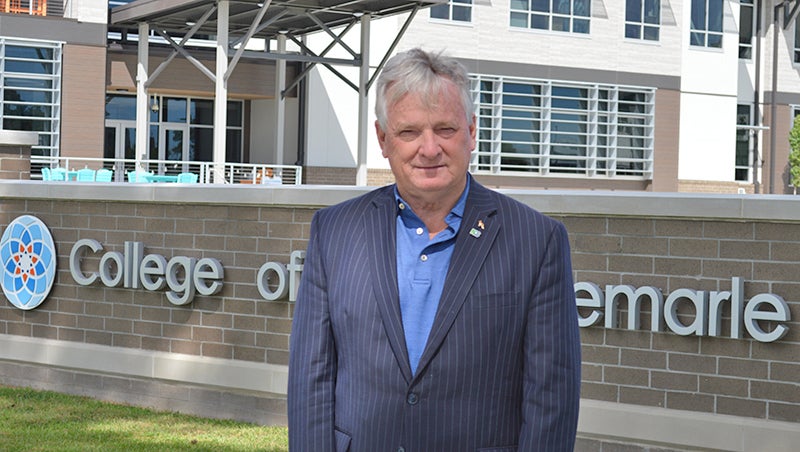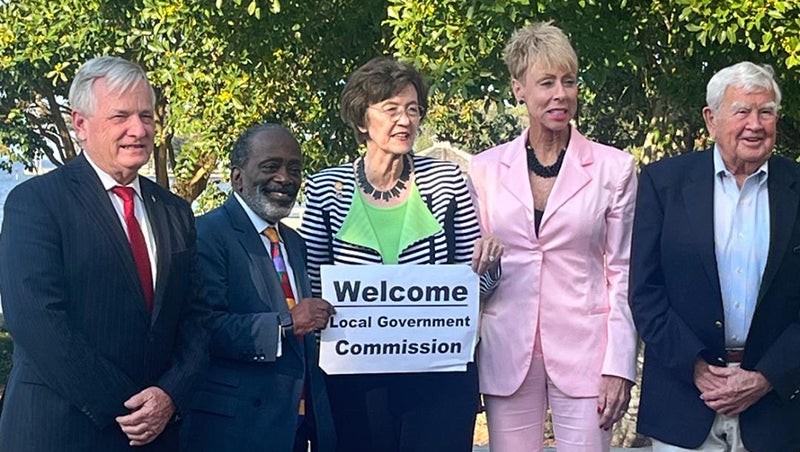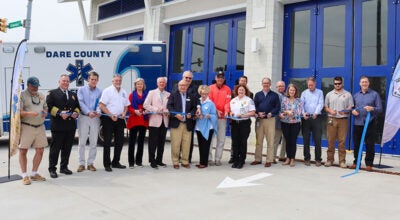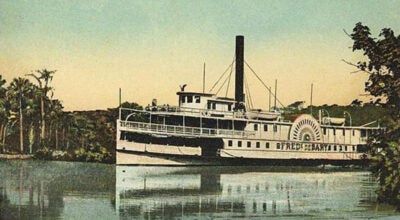North Carolina Treasurer Dale R. Folwell visits northeastern counties
Published 8:21 am Sunday, November 13, 2022
|
Getting your Trinity Audio player ready...
|
This fall, North Carolina Treasurer Dale R. Folwell has visited northeastern North Carolina at least twice.
In late September, Folwell brought the Local Government Commission to Tyrrell County for a regularly scheduled meeting. It was the first time the commission has met outside Raleigh. The commission will hold its November meeting in Cullowee in western North Carolina.
Folwell chairs the Local Government Commission as one of his duties as treasurer.
His second visit to the region was Oct. 17. This visit was to Elizabeth City where he talked about introduced legislation titled Medical Debt De-Weaponization Act.
He has also released the report “Overcharged: North Carolina Hospitals Profit on Medicare.”
Folwell and the staff in the Department of the State Treasurer oversee the health care plan for 740,000 current state employees plus retired public employees.
The state health care system is the largest purchaser of health care in North Carolina.
On Oct. 25, 2022, Folwell announced the state will pay the largest one-time supplemental bonus in history for benefit recipients of the Teachers’ and State Employees’ Retirement System, Consolidated Judicial Retirement System, Legislative Retirement System and the Local and Governmental Employees’ Retirement System.
The supplemental bonus is an additional 4% of the retirees’ annual benefit and was included in the October check.
Folwell and his staff oversee the $122 billion in the state retirement fund of the North Carolina State Retirement System.
Folwell and his team want to give away money. That is, $1.05 billion in unclaimed property. From July 1, 2021 to June 30, 2022, Folwell’s team dispensed $105,158,116 in unclaimed property. Go to nccash.com to search for a name or corporation or school board or other organizations.
And the state treasurer wants all citizens to live life to the fullest extent, including those with disabilities. The NC ABLE program allows those with disabilities and their family members to save for daily, disability-related expenses in a tax advantaged account.
Go to ncable.nc.gov for lots of information.
Local Government Commission
The Local Government Commission was created by the North Carolina General Assembly in 1931 to address local government finance during the Great Depression. It is authorized by North Carolina General Statutes Chapter 159.
The commission now oversees at least 1,100 units of local government.
Commission members include elected officials Folwell; State Auditor Beth Woods; Secretary of State Elaine Marshall; and Secretary of Revenue Ronald Penny. All were in attendance at the Tyrrell County meeting at the Eastern 4-H Center.
Five public members are appointed. Three appointed by the governor are John Burns, former Wake County commissioner; Vida Harvey, vice president and assistant general counsel, Novant Health; and Nancy Hoffman, current member of Greensboro City Council. Paul Butler Jr., former county manager of Sampson County and former chair of NC Parole Board, is appointed by the president pro tem of the NC Senate. Mike Philbeck, appointed by the NC Speaker of the House, is a real estate broker and former Mayor of Shelby. The governmental positions of appointees are dictated by Chapter 159.
The Local Government Commission is involved in all borrowing moves made by local governments and overseeing the fiscal health of county and municipal governments, hospital authorities and water and sewer districts.
Dare County’s finance director David Clawson regularly comes before the county’s Board of Commissioners with a date a limited obligation bond package will be on the commission’s agenda. In the case of recently approved phases for capital improvements for Emergency Medical Services stations, the date for Phase I is currently scheduled for February 2023. The next phase may be as late as February 2024.
When governments get in fiscal trouble, the Local Government Commission assumes responsibility for running the government until it is financially strong. Staff members make on-site visits and provide support to local governments in fiscal distress.
Units of government currently under financial control of the Local Government Commission are Kingstown in Cleveland County; Cliffside Sanitary Sewer District in Rutherford County; Robersonville in Martin County; Pikeville and Eureka in Wayne County; Spring Lake in Cumberland County; and East Laurinburg in Scotland County.
In 2020, Tyrrell County was very, very close to defaulting on payments for sewer lines installed for the Tyrrell County prison. In September 2019, the state’s Department of Public Safety completely shut down the prison. The county and Town of Columbia thought the department would conduct a slowdown in facility numbers. The prison was the largest customer of the water and sewer system.
“Tyrrell was incapable of making payments in the first year,” said county manager David Clegg.
With Tyrrell a few days away of declaring bankruptcy, Folwell asked Gov. Roy Cooper to pay the prison’s bill, estimated at $304,735.73.
Folwell argued “the state should hold harmless local governments like Tyrrell County and the Town of Columbia.” The state paid its bill.
For three years, the state has continued to pay debt service, reported Clegg.
Since 2019, Tyrrell County has remained on the Unit Assistance List. Evaluation of the county’s internal control issues and financial issues with water and sewer fund are now listed as low risk. However, high risk is assigned to the category “Financial Issues General Fund.”
The problem is the fund balance has not met the required 8% set aside.
Clegg responds, what is an appropriate amount for fund balance? The county has 3,134 people and can only tax 47% of its land. The county has a $6 million budget.
The matter has been resolved using COVID funding. The general fund balance now stands at 13% to 14% reports Clegg.
Also on the Unit Assistance List is Hyde County and two utility districts, Engelhard and Swan Quarter Sanitary Districts.
As of July 31, 2022, the list indicates that Hyde County had not filed its annual audit for the fiscal year ending June 30, 2021. That has been resolved said Corrine Gibbs, finance director for Hyde County.
The Engelhard and Swan Quarter Sanitary Districts have also failed to submit audits for both fiscal year 2021 and 2020. The two Hyde County districts are among five on the Unit Assistance List.
State Health Plan
Some 740,000 current state employees and retired public employees depend on the Department of the State Treasurer to run a massive health care system, the North Carolina State Health Plan for teachers and public employees.
Making the decisions is a 10-member Board of Trustees with Folwell chairing the group. The board is made up of “experts in medicine, health administration and education.” The board designs employee health benefits.
Naturally, Folwell is interested in talking about medical costs.
Recently, he released a report titled “Overcharged: North Carolina Hospitals Profit on Medicare.”
“The report found huge disparities between the Medicare losses claimed by hospital executives and the numbers that hospitals reported to the federal government,” states a media release. “This raises serious concerns over hospitals’ commitment to their patients and their charitable mission, and the steep costs passed on to the nearly 740,000 members of the State Health Plan.”
The report was prepared by the North Carolina State Health Plan and Rice University’s Baker Institute for Public Policy. Folwell asked that the report “analyze hospitals’ self-reported Medicare Cost Reports, Internal Revenue Service 990 tax filings, and community benefit reports.” The report was then peer reviewed by the University of Southern California’s Price School of Public Policy.
North Carolina was in the top 10 states with the highest average hospital Medicare profit margins for five years, according to Medicare Cost Report data.
“Only 15 hospitals consistently lost money on Medicare, while 35 hospitals posted profits over all six years in North Carolina,” according to Medicare Cost Report data.
“A range of 55% to 66% of more than 100 hospitals profited off Medicare from 2015 through 2020, according to Medicare Cost Report data,” reports the media release.
In the report, five years of data from the hospitals’ federally-reported Medicare Operating Profit Margin or the Medicare Cost Reports show The Outer Banks Hospital with profit margins running from 1.3% to 1.9% over the five years.
Sentara Albemarle Regional Medical Center margins vary dramatically. In 2020, the center recorded a 16.8% loss. In 2015, the margin was 7.8%. In 2017, the center lost 6.4% but turned that around the next year. The low profit margin was 0.9%.
In another effort, Folwell pushed for the introduction of legislation called the Medical Debt Protection Act, H.B. 1039, filed May 24, 2022. The legislation seeks “to limit the ability of large medical facilities to charge unreasonable interest rates and employ unfair tactics in debt collection …”
The department under Folwell’s leadership has another function. It pays the state’s bills and accounts for all funds deposited and invested. And it is charged with maintaining the state’s AAA bond rating.
SUBSCRIBE TO THE COASTLAND TIMES TODAY!








